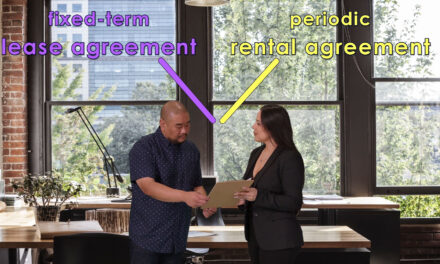This article examines the use of the agency confirmation provision.
The mandated agency confirmation provision
| Confirmation of agency by brokers and their agents is required to be made to all parties involved in a real estate transaction on one-to-four unit residential property, including sales, exchanges and leases of more than one year. | The agency confirmation by brokers is first made as part of the purchase offer. |
The agency confirmation by all brokers involved is first made as part of the purchase agreement offer, typically signed first by the buyer and then submitted to the seller.
In practice, the agency confirmation provision exists in only one format:
- A pre-printed provision included in every purchase agreement form used in real estate transactions on one-to-four unit residential properties. [Calif. Civil Code §2079.17; See first tuesday Form 150, accompanying this chapter]
The agency confirmation provision discloses the existence or nonexistence of each broker’s agency with the different parties to the transaction. The determination and declaration of the actual agency resulting from a broker’s conduct is made by each broker involved. Each broker states for which party he is acting as an agent for in the transaction.
Thus, one broker need not disclose the agency relationship of any other broker involved in the transaction. For example, the buyer’s selling broker need not include the agency of the seller’s listing broker when he fills out his agency confirmation provision. [CC §2079.17(a)]
Also, each time any broker prepares a purchase agreement in which he confirms his agency in the transaction, an Agency Law Disclosure will be attached. The Agency Law Disclosure must be presented to the buyer no later than at the time of signing a purchase offer. Further, the copy signed by the buyer must also be signed by the seller on an acceptance of an offer or a counteroffer – even though the seller has previously signed a copy as a mandated part of the sales listing agreement.
The Rules-of-Agency Disclosure is an explanation of the duties owed under the agency confirmed. [CC §2079.17(d)]
Statutory jargon
The contents of the agency confirmation provision and which agency box the broker should check requires the broker and his agents to first learn and apply the statutory definitions of:
- Agent
- Listing agent
- Selling agent
- Subagency
- Dual agency
By statutory definition, an agent if a broker retained by a client. | The statutory definitions of these terms include their connotations under agency law. Under the statutes, the meanings of agency terms are oftentimes quite different from their use in brokerage jargon. |
For example, by statutory definition, an agent is a broker who has been retained by a client, usually through the efforts of licensed sales agents employed by the broker. However, in the jargon of the real estate industry, a sales agent employed by the broker is customarily called an “agent.”
By statute, the sales agent employed by a broker is defined as an associate licensee – an agent of the agent, not an agent of the client. [CC §2079.13(a),(b)]
Only the broker can be an agent of a client. Sales agents are not permitted to have clients. Sales agents are always employees of the client’s agent – the broker – even though sales agents may be classified as independent contractors for income tax purposes. [Calif. Business and Professions Code §10132]
Who is the selling agent?
The listing agent is also defined as being a selling agent when no other broker is involved to represent the buyer. [CC §2079.13(n)]
Remember, an agent is a broker, not a sales agent employed by a broker. Thus, the listing office/broker is also the selling broker when no other broker is involved and the listing office is “double-ending” a transaction – even though the broker confirms he is the exclusive agent of the seller with no agency duties owed to the buyer. [See Fig. 1]
A selling agent by definition is now a legal schizophrenic with four distinct personalities, each of the four being a different type of agency relationship. [CC §2079.13(n)]
The definition of selling agent includes situations commonly called “selling office” or “selling broker” in the daily practice of brokerage. The definition of a selling agent does not include the listing office’s associate licensee, a sales agent, who might be dealing with a buyer on behalf of the broker. However, the real estate industry presently refers to an associate of the broker who has contact with a buyer as the “selling agent.”
However, only the broker can legally be the selling agent. The broker’s sales agent may be acting on his behalf.
Selling agent now includes the following four types of agency relationships:
- The seller’s listing broker, when acting as the seller’s exclusive agent and no other broker is involved in the transaction acting on behalf of the buyer. [See Figs. 1 and 3]
- Other brokers who work with the seller’s listing broker to locate a buyer, or who are authorized and instructed by the seller’s listing broker to act as a subagent of the seller to also locate buyers [See Fig. 4]
- Brokers locating property for buyers, including single agency and fee-splitting (cooperating) brokers [See Fig. 2] and
- Brokers locating buyers for an owner of unlisted property, a For Sale by Owner (FSBO). [CC §2079.13(n)]
Note in the four definitions above the two objectives of each broker’s solicitation:
- locating property for a buyer; or
- locating buyers for a property.
The solicitation criteria establish the client for whom the broker works.
For example, a broker who is retained by a buyer is said to have listed the buyer or been retained by his buyer. By agency definition, this buyer’s broker now is a selling agent. In practice this broker is also called a “single agent” or “buyer’s broker.”
As a selling agent, the buyer’s broker confirms his agency in the purchase agreement as “the agent of the buyer exclusively” – even though no oral fee arrangements, much less a written exclusive right-to-buy listing, may exist with the buyer.
Of course, the buyer’s broker might find his agency confirmation complicated by having a listing with the seller of the property on which his buyer makes an offer. Thus, the broker becomes a dual agent. Dual agency is confirmed by checking the box for agent of “both the buyer and seller.” [See Fig. 3]
When two brokers are involved in a sales transaction, the seller’s broker (the listing agent) and his client (the seller) will be asked to accept and sign a purchase agreement with the agency confirmation prepared by the buyer’s broker. However, the buyer’s broker might state a type of agency the seller’s listing broker or the seller does not want to create with the “selling broker.” Thus, a counteroffer will be prepared to clarify the agency relationships which exist.
Use of the agency confirmation provision
Both the agency confirmation provision in purchase agreements and the separate Agency Law Disclosure are required as part of a purchase agreement on all offers and acceptances negotiated by brokers to buy, sell, exchange, or lease for more than one year property that included one-to-four residential units or mobilehomes. [CC §2079.17(d)]
Accordingly, transactions involving four-or-less residential units and mobilehomes which require both the agency confirmation provision and the Agency Law Disclosure prior to obtaining signatures include:
- an offer to buy, exchange or lease for more than one year [CC §§2079.14; 2079.17(a)]; and
- an acceptance of an offer to buy, exchange or lease, whether presented by:
- The selling broker as agent to the seller [CC §§2079.14(b); 2079.17(a),(b)]; or
- The listing broker on behalf of the selling broker who is not a subagent of the seller. If the seller’s signature acknowledging receipt of the Agency Law Disclosure attached to the buyer’s offer is not obtained by the listing broker, the buyer’s selling broker may send a copy to the seller by certified mail to eliminate the need for a signed acknowledgment by the seller. [CC §§2079.14(c); 2079.17(a),(b)]
In practice, when a selling broker (or his agent) prepares and presents a purchase agreement offer to the buyer for his signature, the broker will:
- Hand the buyer the Agency Law Disclosure addendum.
- Present the buyer with the purchase agreement containing an agency confirmation provision, along with a review of the purchase price, terms of payment and property conditions.
- Obtain the buyer’s signature on the Agency Law Disclosure and the purchase agreement.
If the seller counters on a counteroffer form that incorporates all the provisions of the buyer’s offer, the seller has signed a writing which includes (by reference) the confirmation of the broker’s agencies. All the seller needs to sign is the counteroffer and the Agency Law Disclosure addendum.
Likewise, should the seller reject the buyer’s offer by a counteroffer prepared on a new purchase agreement form, the seller still needs to sign the Agency Law Disclosure addendum.
Double-ending codified
When only the seller’s listing broker or his agents are involved in a transaction, they typically do not undertake the agency task of working with the buyer to locate suitable property, other than a property from their “in-house” listings. [See Fig. 1] | Should a broker determine the confirmed agency needs to be corrected, a change can be made prior to close of escrow. |
When no attempt is made to represent the buyer in locating outside listings or unlisted property, the seller’s broker is strangely defined as being both the listing agent and the selling agent – but only for the purposes of making agency disclosures, not to become the buyer’s agent.
Ironically, when a broker is said to have “double-ended” a deal, only one broker is involved and only one brokerage fee is paid. What is meant by this phrase is that no “cooperating” selling broker was involved with whom the fee will be split (co-oped).
In practice, the “one-broker” transaction that does not include a dual agency merely requires the listing broker to include a Agency Law Disclosure and confirm his agency as the “exclusive agent of the seller” – an agency confirmation which is part of all purchase agreement provisions. [See Fig. 1]
After a broker confirms his agency, it may need to be changed. Should a broker or any party determine the confirmed agency needs to be corrected, a change can be made prior to close of escrow.
To make the change, a new Agency Confirmation Statement should be prepared and signed by all parties and brokers involved. A statement should be added, noting the Agency Confirmation Statement represents a modification of an earlier agency confirmation entered into in the transaction. [CC §2079.23; See first tuesday Form 306]


















